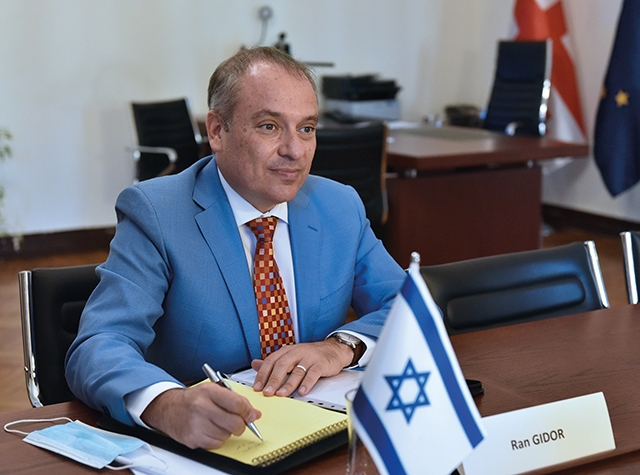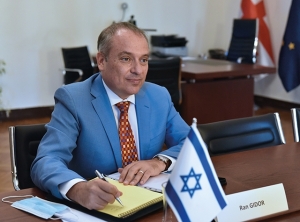Operation ‘Back to Life’: How Israel is Leading the World’s Vaccination Campaign
OP-Ed
Coronavirus knows no borders, as has become all too clear, and countries the world over are all facing the same challenges to public health and their economies. We, at the Israeli Embassy in Tbilisi, welcomed the recent announcement by Ekaterine Tikaradze, Minister of Health, that the Georgian population would be vaccinated soon thanks to the COVAX mechanism and other international channels.
From the outset of the pandemic, Israel emerged as a leading nation in the global fight against coronavirus, learning from the experiences of others and sharing its own with the world. It made the tough choices early on, closing borders and schools, shuttering businesses, and limiting all non-essential activities, and sustained a burst of innovation surrounding the pandemic that included start-ups and drive-through testing centers, through to telemedicine and vaccine research. Israel’s success in responding to the pandemic has continued into 2021, and the country now boasts the highest per capita vaccination rate of any country in the world, outpacing all others by far.
Israel began its vaccination drive in late December 2020, and within just the first two days of the campaign, nearly 30,000 Israelis were given their first dose. Now, just a few weeks later, over 1.8 million Israelis have received their vaccination shot, and the country is on track to vaccinate all citizens over the age of 16 by the end of March.
This speedy and ambitious target has been made possible through a new deal that Israel inked with pharmaceutical companies in early January. Dubbed ‘Operation Back to Life’, Israel is set to receive ongoing shipments of the vaccine over the coming months, which will enable the country to reach its bold target and become one of the first countries in the world to exit from the coronavirus crisis. Moreover, by sharing its statistical data with Pfizer and the world, Israel will also play a key role in demonstrating the efficacy of the vaccine and developing global strategies to overcome the pandemic.
In fact, Israel's small population of some nine million, and its highly efficient public health system, mean that the country is going to play an essential role for pharmaceutical companies. The success and experience of our vaccination campaign will be used to provide the critical information that pharmaceutical companies need in order to make the vaccine even more effective for other countries. By being the first country in the world to vaccinate its entire population with the novel vaccine, Israel will serve as the world's key experimental subject.
Israel’s universal healthcare system is globally recognized for its efficiency and effectiveness. Israel has developed a sophisticated and high-quality level of individual patient care, and all Israeli citizens and permanent residents are guaranteed healthcare under the country’s National Health Insurance Law. All Israelis can choose from four comprehensive not-for-profit health plans that provide a standardized basket of medical services, and each provider must accept all residents regardless of age or state of health. Combined, there are thousands of clinics spread across the country, ensuring that each and every local community is served. Moreover, its national healthcare services enjoy a uniquely advanced level of digitization, which will make Israel's data particularly important to pharmaceutical companies. Israel's extensive national network of medical services lies within the Ministry of Health’s purview.
It was this comprehensive system of doctors, nurses, and medics that rapidly mobilized in response to the coronavirus pandemic, and which is now working towards vaccinating the entire country within a matter of months. In fact, Israel's constant and daily battle with existential threats meant that it was especially well-placed to handle an emergency of the magnitude that coronavirus brought on. The entirety of Israel's national systems thus coalesced around the crisis. The Prime Minister arranged multiple conversations with Pfizer's CEO to secure a steady supply of vaccinations. Magen David Adom – Israel's national emergency response service – continues to be at the forefront of the pandemic, having now been tasked with the responsibility of vaccinating the residents and employees of nursing homes and assisted living centers across the country. The IDF (Israel Defence Forces) similarly mobilized, assisting in administrating quarantine hotels and supplying food to families in lockdown at the height of the pandemic, and now dedicating its own paramedics and military reserves to the current vaccination push. It is thus that Israel holds the world record for its vaccination rate and will be able to rapidly complete its inoculation drive.
The Israeli Embassy and MASHAV (Israel's International Development Agency) have also spared no efforts in supporting Georgia's fight against COVID19. Generous Israeli donations to the Georgian Red Cross Society, the Georgia office of WHO (World Health Organization) and NCDC (National Centre of Disease Control) were much appreciated by our local partners. Moreover, MASHAV has provided funding to David Khosroshvili, a successful Georgian entrepreneur & MASHAV alumnus, towards developing an innovative software designed to help local businesses in adapting to the challenges caused by the pandemic. MASHAV has also invited senior Georgian health experts to participate in the regular consultations of a special international forum designed to share best practices.
With these extraordinary efforts, it is Israel’s hope that on this year’s Passover Seder night, grandparents, parents, children, and grandchildren will be able to gather together around the table once again. And when we ask the traditional question of why this night is different from all other nights, we will be able to answer: “Everything has changed; tonight we are all reclining”. Similarly, the Israeli Embassy will continue contributing to the general effort designed to ensure that as many Georgian friends, colleagues and partners as possible would be able to celebrate the coming Orthodox Easter together with their loving families.
By Ambassador Ran Gidor












